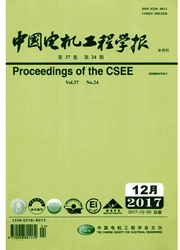

 中文摘要:
中文摘要:
受微电网线路阻抗不匹配等因素影响,传统下垂控制常存在无功均衡问题。应用虚拟阻抗方法可以抑制无功均衡误差。然而,传统虚拟阻抗方法没有充分考虑微电网网络中的不匹配因素。为了提高无功均衡准确度,提出了一种基于微电网全局无功均衡误差最小化思想的虚拟阻抗优化方法。通过微电网网络建模,推导了网络无功均衡误差估算方法。然后,基于无功传输特性设计了自适应虚拟阻抗控制器。在此基础上,构建全局无功均衡误差计算函数并优化,以获得最优控制器参数。该方法实施无需通讯,可在结构复杂的微电网中应用。相比传统虚拟阻抗方法,优化后的虚拟阻抗控制具有网络自适应能力,且无功均衡性能更为良好。仿真和实验结果均验证了所提方法的有效性。
 英文摘要:
英文摘要:
Due to mismatched feeder impedances and other factors, the conventional droop control method always has reactive power sharing issues. The application of virtual impedance method can reduce reactive power sharing errors. However, conventional virtual impedance methods have not fully considered the mismatch factors in mierogrid network. To improve the reactive power sharing accuracy, a virtual impedance optimization method based on the minimization of system global reactive power sharing error was proposed. Through the modeling of microgrid network, an estimation method for network reactive power sharing error was derived. Then, the transmission characteristic of reactive power was analyzed, with an adaptive controller for virtual impedance designed: Based on this, a calculation function for the global reactive power sharing error was established and optimized in order to obtain the best parameters for adaptive controller. The proposed method didn't require communication, and it could be applied to complex structure microgrids. Compared with existing methods, the virtual impedance control after optimization had network self-adaption capability and also better reactive power sharing performance. The effectiveness of the proposed method is proved through both simulation and experimental results.
 同期刊论文项目
同期刊论文项目
 同项目期刊论文
同项目期刊论文
 A Source Current Detected Shunt Active Power Filter Control Scheme Based on Vector Resonant Controll
A Source Current Detected Shunt Active Power Filter Control Scheme Based on Vector Resonant Controll 期刊信息
期刊信息
